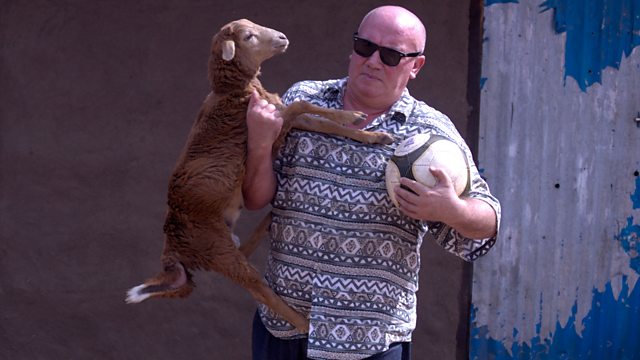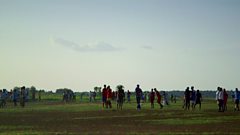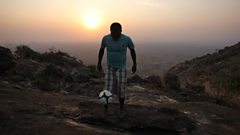
Soccer Coach Zoran and his African Tigers
Documentary which follows veteran Serbian coach Zoran Djordjevic as he seeks to forge South Sudan's first national football team, a fascinating portrait of the birth of a nation.
A gripping story of triumph and failure, set in the world's youngest country.
South Sudan became an independent state in 2011, following almost 50 years of civil war. This documentary follows veteran Serbian coach Zoran Djordjevic as he seeks to forge South Sudan's first national football team. What follows is a fascinating and original portrait of the birth of a nation.
Although still steeped in traumatic memories, the new nation is seeking to make a mark on the international soccer stage under the dynamic and hugely ambitious new coach. The film follows the team over its first year, from the hunt for new players to buying a sheep to be its mascot and the side's first international games. Zoran's aggressive style soon leads to conflict with the chair of the soccer federation. As the euphoria of independence subsides, the team finds itself hit by bitter infighting, malaria and a financial crisis that threatens the state itself.
Last on
More episodes
Clip
-
![]()
Coach Zoran plans a scouting expedition
Duration: 02:47
Soccer Coach Zoran and his African Tigers director Sam Benstead answers the Storyville Q&A

What is more important, story or character?
Story.Ěý Story. Story.Ěý Story.Ěý Story.Ěý Story.Ěý Story – is that clear?
Ěý
What made you first want to explore the subject? Ěý
I wanted to find a way of telling the story of the birth of a nation – South Sudan.Ěý But beyond the diplomatic fanfare it isn’t a straight forward process to film.Ěý So I was searching for a more left of field way into it and I found it with Zoran and the first national football team.Ěý I saw the chance to make an unusual film that combined stirring human stories with black humour and eastern-European folk music.Ěý Who could resist?
Ěý
How long did it take to get the film off the ground? Ěý
It was very quick.Ěý The Storyville team moved things along at a pace.Ěý But we did have a good taster tape by that stage and that made a big difference.
Ěý
What were you most surprised to learn in the course of production? Ěý
The generosity of the South Sudanese; they have just emerged from 22 years of civil war and still face crippling poverty.Ěý But yet to a friendly outsider they will give everything.Ěý I received so many gifts during filming:Ěý shoes, shirts, socks, religious ornaments, soap and footballs.Ěý It taught me that generosity has nothing to do with how much you have to give.
Ěý
What have been the differences in reception to the film in countries it has now travelled to?Ěý
We are early in the film’s trajectory as it’s only been shown at IDFA in Holland.Ěý But the reception there was fantastic.Ěý Zoran came out for the screenings and received standing ovations, which left him very moved.Ěý It was a wonderful experience to start and end the film together and we look forward to doing screenings in other countries.
Ěý
Which documentary has most inspired you?
I greatly admire the work of Sean Fine (“”) and Danfung Dennis (“”) for combining observational scenes with beautiful aesthetics.Ěý And I really enjoyed the Oscar-winning “Undefeated”, which taught me the value of simply “being there” – it’s a film about an American high school football team and the filmmakers didn’t miss a single practice in nine months of filming.
Ěý
Favourite Website/blog?
DVX User where cameramen and cinematographers share advice and argue over largely pointless minutiae.Ěý I confess to being an obsessive researcher of lenses and the like.Ěý Other than that, the Guardian online.Ěý
Ěý
Person you’d most like to interview (living or dead?)
I would interview the respective founders of the world’s main religions.Ěý I would ask them whether they had any inkling at the time of what would later be done in their name.Ěý Do they approve of it?Ěý And did we record their views / life correctly?Ěý Then I would show them Twitter and see what they wanted to write on it.
Ěý
Best piece of filmmaking advice you’ve ever been given?
Be bold, take creative risks and trust your instincts. ĚýAnd perhaps most importantly, “be on time”!
Ěý
Best piece of filmmaking equipment you can’t live without?
My brain.Ěý Although all the shiny and expensive equipment is important in filmmaking, it’s the ideas that matter most.
Ěý
If money was no object, what is your dream documentary subject?
Having recently returned from an extended spell in South Sudan, I would probably go for something like a quiet provincial library in middle England.Ěý There would be a ready supply of Earl Grey and we’d go home at 4.30pm when it closed. ĚýVariety keeps the creativity well stoked.
Ěý
Favourite film of all time?
Boring choice, I know, but it would have to be Casablanca.Ěý Every line and every scene just feels perfect.Ěý If pushed for a more modern choice, I love for its gritty, raw energy and artful documentary feel.
Ěý
Most difficult access?
I once made a series about the police force in Fiji at a time when no one had made an observational documentary in the country before.Ěý For a while all they would allow us to film was the police band but we got there in the end.Ěý
Ěý
Best recent read?
The Goldfinch by Donna Tartt.Ěý A brilliant story beautifully told.
Credits
| Role | Contributor |
|---|---|
| Director | Sam Benstead |
| Series Editor | Nick Fraser |
Broadcast
- Thu 27 Feb 2014 22:00


